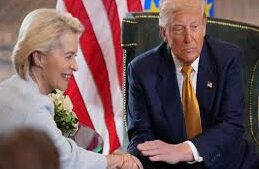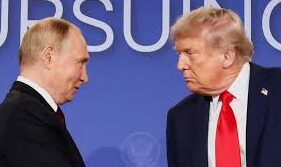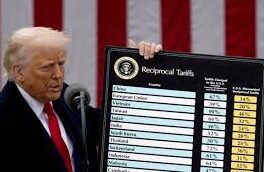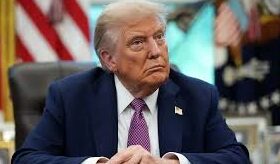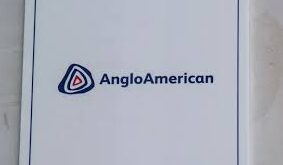US President Donald Trump has pulled back from slapping massive tariffs on European pharmaceuticals and semiconductors, easing fears of a full-blown trade clash with the EU.
Just last month, Trump warned that medicines and chips were left out of a US-EU handshake deal and could be hit with tariffs of 250% and 100% each. But fresh details released Thursday show those products will now face only a 15% tariff, the same as most other sectors in the agreement.
There’s a catch, though. The EU must first pass legislation to cut tariffs on US exports to zero before car tariffs are lowered from 27.5% to 15%.
In a joint statement, Washington and Brussels called this deal a “first step” that could expand as ties develop. The breakthrough was first announced during Trump’s meeting with European Commission President Ursula von der Leyen in Scotland last month. Back then, tariffs were set at 15%—higher than the UK’s 10% deal but lower than Trump’s original threats.
Still, the president’s later talk of extreme tariffs on drugs and chips rattled European exporters. In July, he floated raising pharmaceutical tariffs to 200%, and in early August, he told CNBC they could even hit 250%. “We want pharmaceuticals made in our country,” Trump said.
That was especially worrying for Ireland, a major exporter of medicines to the US. Novo Nordisk, the Danish company behind Ozempic, also stood to lose big. Ireland’s Deputy Prime Minister Simon Harris welcomed Thursday’s announcement, saying the 15% cap gives exporters important protection.
The new tariff rules take effect September 1. The US will apply the 15% rate on most EU goods, including semiconductors and lumber. In return, the EU will eliminate tariffs on all US industrial exports, including fruit, vegetables, pork, bison meat, and nuts.
Only after Europe scraps tariffs on US exports—a step requiring new legislation—will the White House cut car tariffs to 15%. EU Trade Commissioner Maros Sefcovic said the reduction would be applied retroactively from the first of the month when the legislative process begins, adding that Brussels hopes to kick this off in August.
Von der Leyen called the deal a boost for predictability and stability in what she described as the world’s largest trading partnership. “This EU-US trade deal delivers for our citizens and companies, and strengthens transatlantic relations,” she posted on X.
US Commerce Secretary Howard Lutnick hailed the agreement as a “major win” for American workers and industries, saying it gives historic access to European markets.
But not everyone is celebrating. Wine and spirits were left out of the deal, frustrating both European and American producers. France’s wine exporters warned of “major difficulties,” while the US Distilled Spirits Council said the lack of zero tariffs on spirits would hurt growth and add pressure on bars and restaurants.
As Sefcovic admitted, “unfortunately, here we didn’t succeed,” though he stressed that “these doors are not closed forever.”


